Maniac is a true look into the mind of a person, and that person is Cary Joji Fukunaga. We’re no stranger to Fukunaga’s dark look at television and cinema. He’s made his mark with films like Sin Nombre and Jane Eyre, and who can forget his wildly popular and critically acclaimed freshman season of True Detective? Plus with writing credits on 2017’s It, and producer credits for The Alienist, we weren’t sure what to expect with Maniac, but we knew it would follow his dark aesthetic.
But Maniac is Fukunaga’s most light-hearted piece of work so far. The show has a quirky and absurd dark humor that keeps it from ever venturing into the darkness of some of Fukunaga’s other works, and its hopeful ending uplifts the series, preventing from dipping into somberness. But, if works like True Detective and Sin Nombre rocketed Fukunaga to his position as a lauded new director, Maniac shows just how much range he has outside of just the ominous and tenebrous.
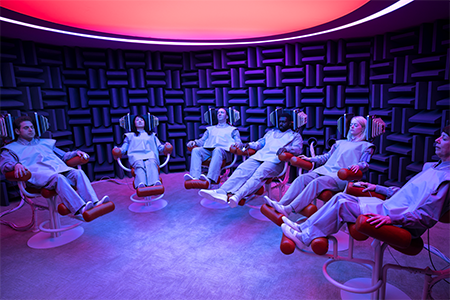

Set in an alternate universe of sorts, where you can have friend proxies and adbuddies, Maniac doubles down on world building for the theme of the story. Showrunner and writer Patrick Somerville told The Hollywood Reporter in an interview, “It’s the universe where Betamax won and Steve Jobs got hit by a bus, or where a number of arbitrary things led to a slightly different series of events between the early 1980s and now.” There’s something familiar about this alternate version of New York, with its exorbitant rent (Owen spending 87% of his income on his miniscule shoebox apartment) and distinct anonymity. Annie floats in an out of her multi-roommate living situation without saying hello or goodbye to the people she lives with, something that is familiar to anyone living with essential strangers in a big city.
Inside this absurdist world, where small robots clean up poop from the streets of New York, there is a pharmaceutical company. Neberdine Pharmaceutical Biotech, or NPB. Its rainbow lined building seems to hide a myriad of secrets and pharma trials that press up against the line of ethics or simply just cross them. This is where Owen Milgrim (Jonah Hill) and Annie Landsberg (Emma Stone) meet, both getting into one of NPB’s trials called U.L.P., where they test out a three-pill regimen meant to cure mental anguish.
As we dive deep into NPB, meeting the ill-fated Dr. Robert Muramoto (Rome Kanda), the cool and cold Dr. Asumi Fujita (Sonoya Mizuno), and the outlandish Dr. James Mantelray (Justin Theroux), it becomes obvious that not everything happening during this trial is strictly above board. The U.L.P. project uses GRTA, a supercomputer, to parse through the emotions and data from their subjects, but after Asumi gives GRTA the ability to feel empathy, the computer experiences immense grief and goes into mourning when Robert suddenly dies.
Locked inside the U.L.P. lab, is a world that feels weird, otherworldly, and robotic. While the pods and the highly regimented living schedules of the patients add to the clinical nature of the trials, the neon pink chamber where GRTA lives and the Technicolor lights of the test chamber reveal the unusual and emotional side of the trials. After all, this is all about trying to systematically eliminate anguish,
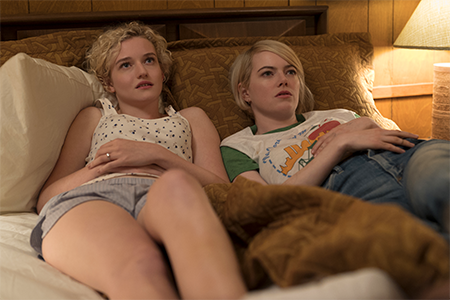
The B pill stands for Behavioral, and it is where the patients identify their defense mechanisms. This is also the most hallucinogenic phase during the regimen. While the A pill sets up exposition for the story, the B pill is where Fukunaga’s vision for Maniac really shines. It throws Annie and Owen into each other’s minds, pairing them together for hundreds of dreams or “reflections”, where they live different lives in different genres and different storylines. But every time, they are together.
The B pill is where the story ramps up. Both Hill and Stone shine in their different dramatic roles. They play Linda and Bruce Marino, a couple living in 80’s Long Island. Then they’re Arlie Kane and Ollie Hightower, a couple of con artist thieves at a mid-century seance. These reflections not only serve as a playful investigation into Owen and Annie’s minds but also become vehicles that Fukunaga can use to display his skill in directing genres outside of dark thrillers or gritty dramas.
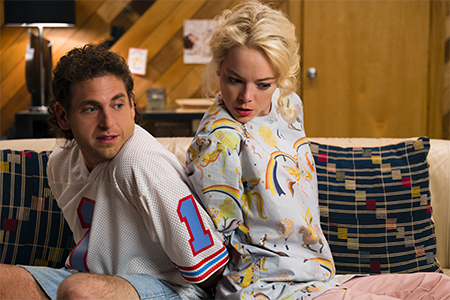
Beyond Annie and Owen, there is the U.L.P. team. James, ousted from U.L.P. years before, returns to the project after Robert’s death. Asumi and James designed GRTA, the supercomputer, basing it off of James’s estranged mother, Dr. Greta Mantleray. Forced to call her in after it is revealed that GRTA is depressed and overcome with grief after losing Robert — the two had a romantic relationship — Greta’s arrival unveils the plethora of mommy issues that James suffers from along with the severity of GRTA’s grief.
As the subjects dive deep into the C pill, which stands for confrontation, the reflections turn from story-like to dream-like. The surreal and absurd grow exponentially as Annie finds herself in a fantasy setting akin to The Lord of the Rings and Owen becomes an FBI informant a la The Departed. From outrageous shoot-outs and interrogation sessions to picturesque landscapes and fairy queens, this is the first time Annie and Owen are apart since starting the study. Annie realizes the falseness of the reflection, but Owen sinks deeper into the blood-is-thicker-than-water mentality of his family.
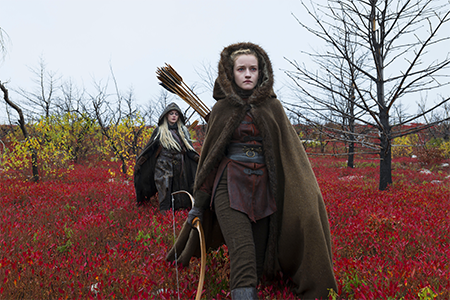
Annie decides to go with GRTA, having no idea that the hawk she just shot out of the sky is actually Owen. She becomes a McMurphy, the code name used for subjects who have had their minds captured by GRTA. This puts the body of the subject in a vegetative state while their mind stays with GRTA.
The final reflection comes after Annie has made this decision. Outside of the study, the U.L.P. labs are having a meltdown. James has gone temporarily blind, hysterically struggling with his mother, who is trying to hug away his problems. Asumi is facing the mounting pressure of trying to make sure this trial is successful because it is the final trial. GRTA has locked everyone in, wanting to keep everyone with her, risking a potential six McMurphy’s in the process.
In the final reflection, it’s a combination of Independence Day meets E.T. meets every bad Icelandic accent you’ve ever heard. Seriously, who okayed that cringe-worthy accent? The doomsday reflection revolves around Owen’s character Snorri Agnarrson, who has accidentally killed a little blue and orange alien named Ernie, setting Ernie’s alien race upon earth as a result. He sits before a U.N. conference, with Annie as a nameless FBI agent sitting in the audience. This is easily the weakest reflection, feeling unstable like some of the deeper dream levels in Inception. Here it’s not about the plot of their story, it’s nowhere as detailed as the séance reflection. Here, everything is as off-target and amiss as the word Utangatta implies.
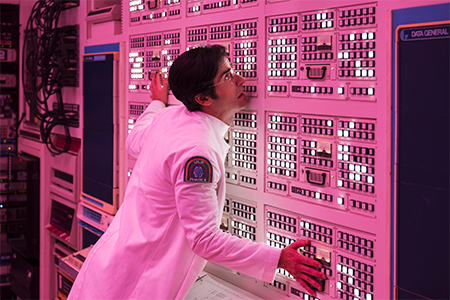
Throughout the series, we meet the two ghosts that are haunting Annie and Owen’s life, and they find their way into the spotlight in the final episodes. For Annie, it is Ellie, an opaque spectre. Ellie is her companion during her fantasy reflection, present all through her A pill reflection, and the subject of the confrontation Annie must face during her C pill stage. All through the series, we know that if Annie were able to confront and move past Ellie’s death, it would help her with her depression and the grief in her life.
For Owen, his ghost is Grimsson, who looks like a mustachioed version of his brother Jed. Grimsson doesn’t just haunt him in his reflections, we see him everywhere. He’s there whispering in Owen’s ear when he first meets Annie, he’s always there, confirming his delusions and hallucinations. Grimsson both acts as a protector to Owen but also reaffirms that Owen suffers from hallucinations. As long as Grimsson exists, Owen is never truly sure whether something is real or fake. Grimsson appears in the final reflection, guiding Annie and Owen. He leads Annie to confront GRTA and takes Owen to the mental Rubik’s Cube. Owen solves it and, somehow, saves the day.
This brings all the subjects back to consciousness. Annie has finally confronted GRTA and Ellie, apologizing for a myriad of mistakes that she made even after Ellie’s death. Ellie was the one person who truly knew Annie, and she was terrified to lose her, but now she’s ready to let her move on. Awaking from their reflection, the subjects are sent on their way, told that it was successful, not realizing that GRTA has been “killed” and taken offline by a desperate James and Asumi.
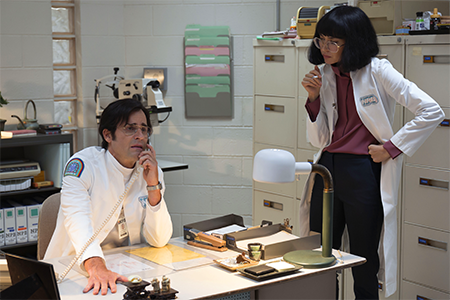
For our protagonists, the journey to a new phase in life is not as simple. Owen must face his monstrous family. They have been expecting him to lie for his brother, giving Jed an alibi so that he can get out of his sexual harassment trial. He gropes women and sexually assaults them, forcing one of them to urinate on him before she runs from his office in tears. Owen faces his family, deciding that blood is not thicker than perjury and morals. He confirms that the camera footage they have is of Jed and that he is a horrible shit bag of a person. Jed loses his case and the family abandons Owen, having him committed.
Having done most of the emotional heavy lifting during her three pill regime, Annie goes to speak to her dad and confront him; the two of them reconcile. It’s not as gratifying as Owen’s middle finger to his family, but it offers a form of reconciliation. The series ends with Annie finding Owen, breaking him out of the facility he’s in, and the two of them driving off together into the sunset towards Salt Lake City.
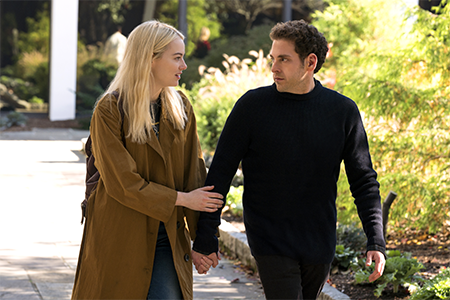
While often times the tone of the show could be likened to a Wes Anderson production, with its candy-colored sets and distinctive character aesthetics, it has its somber and real moments. You’re never allowed to fully drown in the dream because that’s not what it is. It’s a reflection. The world built in the mind is meant to serve as a vehicle to show the subject their defense mechanisms.
Maniac isn’t perfect. The tone, atmosphere, world-building are stellar, but it has its faults. The trial and U.L.P.’s storyline feels unfinished and murky, seeming more distant in the conclusion of the story than when we started. The psychological diagnoses are also questionable. Is Owen a schizophrenic? It would match up to his hallucinations and hearing voices. If so, should he actually be leaving with Annie? Can a grief like Annie’s really be exorcized after a three-day drug trial? For someone so addicted to the drug, she seemed to drop the habit as quickly as she acquired it.
There are holes in the plot, questions left unanswered, and a simple desire to just learn more. But, the ending leaves us satisfied. Despite the questions and concerns, it feels good to see Owen and Annie finally smiling and feeling happy after spending so long being sad. It feels good, and sometimes that is enough.